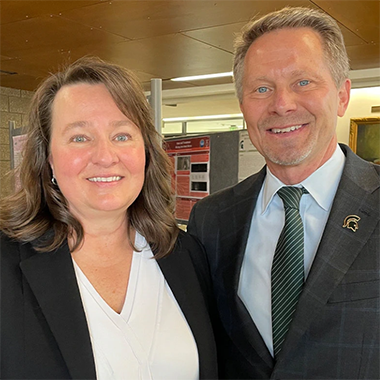MSU welcomes Hao Zhang
Article Highlights
- Hao Zhang, a professor of statistics and of forestry and natural resources at Purdue University, will be joining Michigan State University as the new chair of the Department of Statistics and Probability.
- Zhang, who earned his doctorate in the department that he’ll be chairing, brings in a wealth of experience in leadership and cutting-edge research, especially in areas where statistics and probability can address real-world problems.
- “Statistics has a major effect on society and plays a vital role in shaping it,” Zhang said. “This is a great opportunity for me to bring my experience and make an impact on MSU’s department, to which I feel very much attached. I look forward to collaborating with colleagues and researchers in the department and across many disciplines.”
Michigan State University and the College of Natural Science welcome Professor Hao Zhang as the new chair of the Department of Statistics and Probability.
Zhang officially begins his new role on May 16.
The former head of the Department of Statistics at Purdue University, Zhang will join MSU as chair of the department where he earned his doctorate. He is returning with a wealth of experience in leadership and cutting-edge research, as well as with a vision for growing the department.

“Statistics has a major effect on society and plays a vital role in shaping it,” Zhang said. “This is a great opportunity for me to bring my experience and make an impact on MSU’s department, to which I feel very much attached. I look forward to collaborating with colleagues and researchers in the department and across many disciplines.”
Zhang sees big opportunities at MSU and is excited to build on the department’s strong foundation of scholarship, education and innovation.
“As Interim Chair, Lyudmila Sakhanenko steered the department with commendable leadership though the challenging period of COVID-19,” Zhang said. “Among her many achievements is the successful launch of a highly sought-after master’s program in data science.”
As chair, one of Zhang’s priorities will be driving the department toward deeper societal impacts in areas including artificial intelligence, environment and economics, where statistics can play a major role.
“An enthusiastic welcome to incoming chair Dr. Hao Zhang, who is a theoretical expert studying real world data analysis, and the statistical analysis of large spatial data sets,” said Phil Duxbury, Dean of the College of Natural Science. “At MSU, he will build on the excellence of the Department of Statistics and Probability and expand its connections across campus to support existing collaborations in areas such as data science and emerging collaborations including in artificial intelligence.”
A Spartan leader
Early on in his studies, Zhang majored in mathematics at Peking University where he went on to earn his master’s degree in statistics. For his doctorate, he attended MSU’s top-tier program.
“I’ve always found math enjoyable and interesting and when I was younger, I didn’t have to study hard or memorize formulas — it just made sense to me,” Zhang said. “It also feels natural to teach what I love. I come from a family of teachers. Good teachers, like good leaders, spark curiosity and teach people how to think.”

After completing his education, Zhang’s interest shifted towards leveraging his mathematical skills to solve real-world data analysis challenges. Inspired by consulting projects, Zhang redirected his research focus to spatial statistics, an area with many applications in the environment and climate change.
His solid foundation in probability and mathematical statistics, combined with an earnest interest in practical applications enabled him to make unique and impactful contributions to spatial statistics. In 2007, Purdue University recruited him and, in 2015, he was appointed head of their large statistics department.
A bottom-up approach
A common practice in statistics is to understand and develop theory first, and then determine its applications, Zhang said. Although he was influenced by this practice throughout his education, he would break away from it and adopt what he calls a bottom-up approach in statistics.
This approach involves talking to the researchers and scientists who are collecting data in a given field to help them determine how to best use the data to solve their problems. Their specific needs can then be met with new statistical methodologies, computations or theoretical frameworks.
In his own research, Zhang uses spatial datasets — data collected at different locations — to mitigate the risks of climate change on agricultural production. He collaborates often with experts in a broad array of fields including health sciences, forestry, climate science, economics, agriculture, natural resources and environmental science. He is a fellow of the American Statistical Association and an elected member of the International Statistical Institute.
What’s next
When Zhang begins his role, he will work to foster a research culture that is rooted in this bottom-up approach. He believes that by always asking what’s going on in the real world, what scientists are doing and what problems they face, it will keep the department at the forefront of the latest research.
“Food, health, the environment, and security — these are things that matter to society and statistics can contribute in all these areas,” Zhang said. “I want us to think big, and to conduct the most impactful research.”
Interdisciplinary collaboration is key to making this happen. Understanding the motivation behind research problems and collaborating with the scientists will make research more impactful whether it is theoretical or application specific. Working with people of broad backgrounds and using statistical language they can understand is key to success, Zhang said.
For Zhang and many of his colleagues, another area of special interest is the recent technological explosion behind artificial intelligence. Even in these early stages, AI has already brought with it many opportunities in the field, especially for researchers working with large, complex datasets.
“We must be forward thinking and position the department in the era of big data, data science, and artificial intelligence,” Zhang said. “Statistics plays a vital role in all these areas and if we prioritize these areas in the classes we offer and the research we are doing, MSU will be a leader in this work.”
Returning to MSU
Zhang is looking forward to returning to MSU and the beautiful state of Michigan, where he has many friends and colleagues — both lifelong and newer relationships. Beyond that, he’s excited to be returning in a leadership position where he can make an impact on the department and the field.
His wife, Dr. H. Holly Wang, will join the Department of Agricultural, Food and Resource Economics at MSU, and they are looking forward to living in the same state as their daughter, Rachel.
In his spare time, Zhang is an avid skier and an increasingly dedicated runner who has completed three half marathons. This October, he will be running his first full marathon in Chicago alongside his family.



